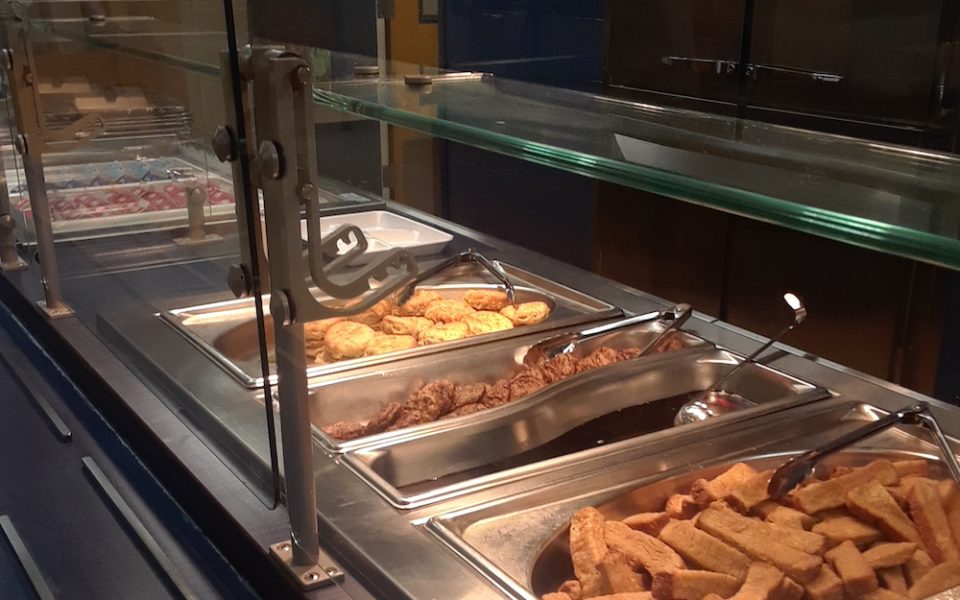
So many green beans.
While the hallowed halls of school are empty, the kitchen is alive with activity. Hundreds of small Styrofoam cups stand like soldiers on trays as workers fill them feverishly with spoonfuls of warm green beans. Steam billows up from the hot pans filled to the brim with more pods. Garlic and paprika spice the air as the next set of pans are carried away, only to be replaced with more Styrofoam cups, more beans, and then more scooping. The low din of kitchen noises combined with the whirring of the powerful exhaust system fans punctuates laughter and chatter.
Tracie Fulp, Carver High School’s foodservice supervisor and her team prepare breakfast and pack lunches to feed hundreds of children each weekday during the summer. Carver is the largest and busiest site for the Winston-Salem/Forsyth County School summer nutrition program. Ward Elementary and Union Cross Elementary are second and third. Between five vans and 15 employees, more than 450 meals get packed up daily to be delivered into area neighborhoods so that kids have something to eat.
Also known as the Summer Food Service Program, this US Department of Agriculture offering ensures that children in low-income areas continue to receive nutritious meals during the summer, and other times when they do not have access to school lunches or breakfasts.
In addition to lunch, shelf-stable breakfast packs are also available.
“We’re worried about the kids eating. This is just one more option for them to eat,” Fulp said. The packs are given to the children in order to tide them over until “we can get back to them the next day.”
Today’s lunch: cheeseburgers, packs of baby carrots with ranch dressing, fresh fruit, juice and water. And, of course, green beans. They never know how much to make, but they never run out of food.
“It’s a guessing game. They get demographics from property managers and after the first week, we adjust as we go.”
Kerry Riddick, food service supervisor for North Forsyth High School, is one of the system’s van drivers. This year marks his second summer working with the program.
“I’m taking 90 meals out today and that will give me more than enough” he says. “If I feel we are going to run out of food, I’ll contact another supervisor. We do the very best we can to make sure each kid gets food.”
The school district food truck that circulates in neighborhoods without transportation access to food sites originates and operates out of Union Cross Elementary School in Kernersville.

While the Winston-Salem metropolitan area is seventh in the nation for food hardship among children, according to the Food And Action Center, more than 26 food- and hunger-related partner agencies and groups are listed on the city of Winston-Salem’s website. In 2018, Mayor Allen Joines announced a major citywide campaign called “Think Orange” to combat hunger and food insecurity in Winston-Salem and Forsyth County. The Think Orange campaign is funded through a $115,500 grant from the National League of Cities in partnership with the Washington, DC-based Food Research and Action Center. Winston-Salem is one of six cities selected. The Think Orange campaign encompasses nine major initiatives including expansion of summer nutrition programs and a hot meals after-school program for children that is a partnership with the Second Harvest Food Bank of Northwest North Carolina.
In Guilford County, lunch is offered in select parks as part of the ENERGY in the Park, a summer playground program. Greensboro Parks and Recreation also provides free meals to children participating in its recreation center day camps.
One set of groups aims to put plans into action sooner, rather than later. The Urban Food Policy Council in Forsyth County has been commissioned since 2018. The council, which was formed to initiate and promote actions that increase food access in Winston-Salem, and which has a Childhood Hunger Action Group working to implement a universal breakfast-in-class program in all public schools where 50 percent or more students receive free or reduce-price lunches.
Marcus Hill, a member of the Food Policy Council and co-coordinator of Forsyth Foodworks, is a staunch supporter of food systems in the area.
“It’s been tricky to find the agency as for what this council can do, what power does it have and what we can do,” he says.
As one of 34 councils in the state of North Carolina, it aims to highlight local food councils and change food systems.
Until then, the green beans are packed, ready to go. The day’s work is not done.
To find summer meal programs and sites near you, text SUMMER MEALS to 9779 or your ZIP code to 877-877. Call the Hunger Hotline at 866-348-6479 or visit the USDA website here.
Join the First Amendment Society, a membership that goes directly to funding TCB‘s newsroom.
We believe that reporting can save the world.
The TCB First Amendment Society recognizes the vital role of a free, unfettered press with a bundling of local experiences designed to build community, and unique engagements with our newsroom that will help you understand, and shape, local journalism’s critical role in uplifting the people in our cities.
All revenue goes directly into the newsroom as reporters’ salaries and freelance commissions.


Leave a Reply